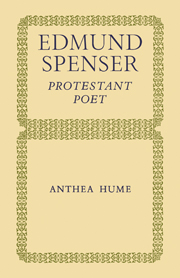Summary
I have left until the end of the book a fundamental critical question which continues to provoke sharp disagreement among Spenserians: should Spenser be regarded, at least in part, as an esoteric poet? Several distinguished modern critics have argued that he should. A theory of poetry still available in England at the end of the sixteenth century would certainly permit such a view of this Elizabethan writer. Renaissance Neoplatonism had given renewed prestige to the belief that poetry contained secret wisdom to be hidden from the multitude. The case for regarding certain episodes of The Faerie Queene as deliberately obscure (for example, the Cave of Mammon, the Garden of Adonis, and the Temple of Isis) has been argued by Frank Kermode in an influential essay on the Cave of Mammon:
[Spenser] is, in his way, an esoteric poet; like all poets in the Neo-Platonic tradition, not only the guardian of secrets but the creator of new secret wisdom. The position is one that was so familiar to Renaissance poets that to put it out of one's mind is almost certainly to distort one's reading not only of a Chapman or a Spenser but even in some degree of Shakespeare; for it was taken for granted that one of the properties of a fiction, however exoteric it might appear, was the possession of occult significance.
- Type
- Chapter
- Information
- Edmund SpenserProtestant Poet, pp. 162 - 184Publisher: Cambridge University PressPrint publication year: 1984

